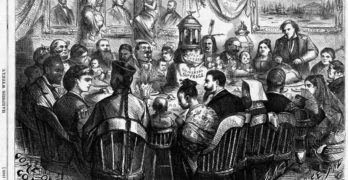
We should know that whether we are a leader, laymen, single, married, young or old; we are all prone to desires, appetites, passions, and sexual temptations although the enemy of our souls is mainly targeting leaders. Maybe it is the reason why Paul says,
I sometimes think God has put us apostles on display, like prisoners of war at the end of a victor’s parade, condemned to die. We have become a spectacle to the entire world—to people and angels alike (1 Corinthians 4:9 AMP).
Galatians 6:1–2 declares, “Brethren, if a man is overtaken in any trespass, you who are spiritual restore such a one in a spirit of gentleness, considering yourself lest you also be tempted. Bear one another’s burdens, and so fulfil the law of Christ.”
I remember a story that describes two church elders a few years ago who had the task of approaching a man in their church who was in an adulterous relationship.
On their way to the man’s home one elder said to the other, “Do you believe that you could fall into this sin?” the reply: “No I cannot.” The elder who asked the question then said, “You are not qualified to go in and approach this man” and the visit was cancelled.
The lesson here is the person who knows full well that he or she could do the very same thing if it’s not by the grace of God is the only person qualified to help a fellow Christian caught in any kind of sin.
No one can tell someone that during your pastoral or business life, of all the things that would ever happen to you, there will be a temptation to sexual sin. We all depend on the grace of Christ every day. We all have areas in our lives that have been regenerated by the Lord, while others still need work from Him. We are an ongoing work and we all work out our salvation with fear and trembling. None of us remains faithful in our strength.
Therefore, we are to bear and share one another’s burdens in any area of temptation. If we don’t, we could fall into temptation ourselves, as well as spiritual pride. One of the sins God hates is pride and self-righteousness. Ironically, in her Prophetic Journal, Wendy Alec said something that would indeed seem prophetic considering the circumstances that led to the breakdown of her marriage to Rory Alec. She wrote that:
The Church has also been embroiled in self-righteousness which prevents many people from crying out for help in an area of failure. Why? Because many times the people who cry out for help are isolated, are ostracized and their confidence is betrayed. This leads the ministers or other children of God to remain silent and instead lead double lives. Many of us know that people will betray our trust if we admit our need for help for our past failures. The enemy of our souls knows the politics of the church very well and he uses it to his maximum advantage.
We cannot lean on our own integrity or morality, or pride ourselves that we are not as weak as another who has already fallen. We must first remove the plank from our own eye, and then we will see clearly to remove the speck from our brother’s eye (see Matthew 7:5). The Lord loves all people, even the murderers, the rapists, the prostitutes, and the thieves; He just hates their sins as much as He hates my pride, hypocrisy, gossip, anger, and unforgiveness.
We can’t compare our sins to other people’s sins and say, “I think I am doing pretty well in that area; forget it.” God says, “But we are all as an unclean thing, and all our righteousness are as filthy rags; we all fade as a leaf, and our iniquities, like the wind, have taken us away” (Isaiah 64:6). And Paul writes, “For all have sinned and fall short of the glory of God” (Romans 3:23).
The enemy of souls knows us very well and he doesn’t give up on us so easily. A good example is found in the story of Balaam, who had been hired to curse the children of Israel. But the Lord would not listen to Balaam, and God turned the curse into a blessing for His children (see Deuteronomy 23:15)
The Lord had blessed His children after all of those who were disobedient had died in the wilderness (see Numbers 24:5–6; 26:63–65). So those who remained were guided by a cloud by day and a pillar of fire by night, which symbolizes the presence of the Holy Spirit residing with His people. Despite the Lord’s blessing on Israel, Balaam did not give up his strategy of cursing Israel.
After Balaam failed to bring a curse upon Israel, he decided to use another strategy altogether. He reportedly advised Balak to use Moabite women as a snare, to entice the men of Israel into sexual immorality and idolatry.
When the Israelites sinned against God, they cursed themselves and 24,000 of them perished (see Numbers 25). Moses further stated, “Look, these women caused the children of Israel, through the counsel of Balaam, to trespass against the Lord in the incident of Peor, and there was a plague among the congregation of the Lord” (Numbers 31:16).
In Paul’s day, the New Testament tells us that the city of Corinth was a great trading centre, much like London, New York, or Las Vegas is today. It was a Roman colony that attracted a cosmopolitan population of Romans, Greeks, and Jews. The inhabitants worshipped many gods and among them was Aphrodite the goddess of love and sex.
The temple of Aphrodite had 2,000 priestesses who were prostitutes because the worship of this goddess involved intercourse with a priestess. They were also male prostitutes and the Temple of Apollo employed men whose job was to fulfil the sexual desires of male and female worshipers.
It was about this that Paul explained that some Christians were excusing their sins by saying that Christ had taken away sin so they could live as they pleased. Therefore, Scripture did not strictly forbid what they were doing.
Paul responded to this claim by explaining that though Christ has taken away our sins, this does not give us the license to get involved in sexual sin wherever we please. God commands us to repent and obey Him. There is no other option.
Paul told the Corinthian believers not to be deceived in response to this very situation:
Do you not know that the unrighteous will not inherit the kingdom of God? Do not be deceived. Neither fornicators, nor idolaters, nor adulterers, nor homosexuals, nor sodomites, nor thieves, nor covetous, nor drunkards, nor revilers, nor extortioners will inherit the kingdom of God. And such were some of you. But you were washed, but you were sanctified, but you were justified in the name of the Lord Jesus and by the Spirit of our God. (1 Corinthians 6:9–11)
Paul knew that sexual immorality scars our souls and damages our emotions more severely than any other sin we could commit. This is why he goes on to tell the Corinthians:
Shun immorality and all sexual looseness [flee from impurity in thought, word, or deed]. Any other sin which a man commits is one outside the body, but he who commits sexual immorality sins against his own body……(see 1 Corinthians 6:18–20 AMP)
Paul is emphasizing that the body is not meant for sexual immorality, which suggests that the body was not made for immoral or unauthorized sex. The apostle Paul tells us that our bodies belong to our spouses because God designed marriage so that through the union of husband and wife the two become one (see Genesis 2:24).
This is why he goes on to tell us not to “deprive each other of sexual relations, unless you both agree to refrain from sexual intimacy for a limited time so you can give yourselves more completely to prayer. Afterward, you should come together again so that Satan won’t be able to tempt you because of your lack of self-control.” (1 Corinthians 7:5 NLT).
How do we overcome Sexual Temptation?
If we are going to survive sexual temptation when it comes, the first thing we must do is recognize that our bodies react to physical beauty. If we spend enough time with someone we are attracted to (and that is not our spouse), we might be asking for trouble.
Billy Graham managed to maintain his integrity for decades by following a set of hard and fast rules designed to keep married men from doing something stupid. One of Billy’s rules was this: “Never allow yourself to be alone with a woman who is not your wife.”
It was the poet William Blake who said, “The naked woman’s body is a portion of eternity too great for the eye of man.”
When Albert Einstein was challenged to give a simple presentation of his theory of time’s relativity, he replied: “One minute sitting on a hot stove seems longer than one hour talking to a pretty girl!”
And John Eldredge noted an interesting observation about the poetry, music, and drama devoted to the beautiful woman:
Listen to the language men use to describe her, watch the powerful obsession at work. What else can this be but worship? Men come into the world without the God who was our deepest joy, our ecstasy—we meet Eve’s daughters and we are history. She’s the closet thing we’ve ever encountered, the pinnacle of creation, the very embodiment of God’s beauty and mystery and tenderness…. A man without his true love, his life, his God will find another—what better substitute than Eve’s daughters. Nothing else in creation comes close.
Many born-again Christians think they will never think about an extramarital affair, forgetting the fact that men are sexual creatures and can be attracted to women other than their wives.
Men face different temptations because they can separate their thoughts from their feelings, whereas a woman thinks as a whole person. This is why a man can be in love with more than one woman at once, but a woman can generally only be in love with one man at a time.
A recent study has shown that a man’s brain has a physiological response to seeing a beautiful woman that is comparable to his response to food. Apparently, when a man sees a beautiful woman, the “pleasure” circuits in his brain react. This is a physical response, and it is part of a male’s design.
The temptation to sexual sin comes when life does not turn out the way we had planned. Sin at one point in our life that we would have spurned begins to look attractive and inviting.
Little rationalizations play themselves out in our minds. Though we would think people are most vulnerable to temptation in seasons when their energy level and appetites are highest, it is in fact when we are in the valley, when we are struck by sadness or desolation that we meet Potiphar’s wife.
There are three main areas in our relationship with God that the enemy will always challenge: the will of God, the Word of God, and the worship of God. Every temptation that Satan throws at us will challenge these three basic values (see 1 John 2:15–17).
But the writer of Hebrews tells us, “For we do not have a High Priest who cannot sympathize with our weaknesses but was in all points tempted as we are, yet without sin” (Hebrews 4:15). Jesus knows what we are experiencing, and He is willing and able to sympathize with our struggles if we turn to Him when we are tempted.
Paul says that God knows how much we can bear and He’ll give us the grace we need to bear it. In a society filled with sexual images and moral depravity, Paul encourages us that temptations happen to everyone, so we should not feel as if we have backslid because the temptations in our life are not different from what others experience. And because so many others have resisted temptation in the past, then so can we. Most importantly, when we are tempted God will show us a way out so we can endure it (see 1 Corinthians 10:12-14).
The enemy knows that those who love the Lord most and hunger for His presence are those who have been most damaged in this area. We need to carry our cross and die every day because to die just once in this sex-saturated society is not enough. It has to be a daily personal experience with the Lord who alone can enable us to overcome temptation.
The old man we are trying to kill will eventually take over if we don’t put him to death every day. When used in the right context, this desire for love will draw us to our wife if we are married or to find a wife if we are still single.
Second, we must remember our covenant with God and with our wife, making sure we don’t put ourselves in a situation where temptation will become too strong for us.
Thirdly, we are not to trust ourselves. Rather, we are to trust the Holy Spirit to give us strength to resist temptation.
Part of this article is extracted from Reclaiming the Forgotten Biblical Heritage -Volume 2


















































